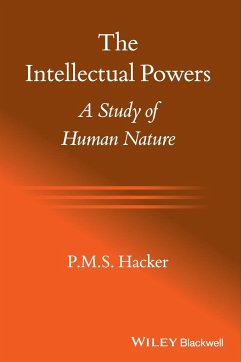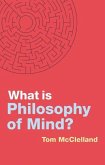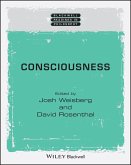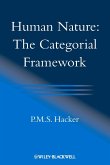The Intellectual Powers is a philosophical investigationinto the cognitive and cogitative powers of mankind. It develops aconnective analysis of our powers of consciousness, intentionality,mastery of language, knowledge, belief, certainty, sensation,perception, memory, thought, and imagination, by one ofBritain's leading philosophers. It is an essential guide andhandbook for philosophers, psychologists, and cognitiveneuroscientists.
The culmination of 45 years of reflection on the philosophy ofmind, epistemology, and the nature of the human person
No other book in epistemology or philosophy of psychologyprovides such extensive overviews of consciousness,self-consciousness, intentionality, mastery of a language,knowledge, belief, memory, sensation and perception, thought andimagination
Illustrated with tables, tree-diagrams, and charts to provideoverviews of the conceptual relationships disclosed byanalysis
Written by one of Britain's best philosophical minds
A sequel to Hacker's Human Nature: The CategorialFramework
An essential guide and handbook for all who are working inphilosophy of mind, epistemology, psychology, cognitive science,and cognitive neuroscience
The culmination of 45 years of reflection on the philosophy ofmind, epistemology, and the nature of the human person
No other book in epistemology or philosophy of psychologyprovides such extensive overviews of consciousness,self-consciousness, intentionality, mastery of a language,knowledge, belief, memory, sensation and perception, thought andimagination
Illustrated with tables, tree-diagrams, and charts to provideoverviews of the conceptual relationships disclosed byanalysis
Written by one of Britain's best philosophical minds
A sequel to Hacker's Human Nature: The CategorialFramework
An essential guide and handbook for all who are working inphilosophy of mind, epistemology, psychology, cognitive science,and cognitive neuroscience
"This is Peter Hacker at his best - an investigation of the cognitive and cogitative powers that quintessentially distinguish us from other animals which is at once painstaking, unsettling, and bracing." -- A.W. Moore, St Hugh's College Oxford
"A meticulous, illuminating, and brilliantly sustained exercise in conceptual cartography. This is Peter Hacker writing at the height of his formidable powers and displaying his unerring ability to uncover philosophical pretension and confusion." -- John Cottingham, University of Reading and Heythrop College, University of London
"A meticulous, illuminating, and brilliantly sustained exercise in conceptual cartography. This is Peter Hacker writing at the height of his formidable powers and displaying his unerring ability to uncover philosophical pretension and confusion." -- John Cottingham, University of Reading and Heythrop College, University of London
"Peter Hacker is the most subtle and penetrating philosopher of the age. In recent years he has demolished the pretentions of cognitive neuroscience and caused outrage among fellow philosophers by showing that many of their claims are meaningless. The Intellectual Powers, his most recent book, is another masterpiece, examining the cognitive capacities of the human species. If, as the Ancient Greeks believed, philosophy is the most important subject, Hacker is one of our most seminal thinkers." (Matthew Syed, The Times, 7 December 2013)
"An essential guide and handbook for all who are working in philosophy of mind, epistemology, psychology, cognitive science, and cognitive neuroscience." (Expofairs.com, 21 November 2013)
"An essential guide and handbook for all who are working in philosophy of mind, epistemology, psychology, cognitive science, and cognitive neuroscience." (Expofairs.com, 21 November 2013)








